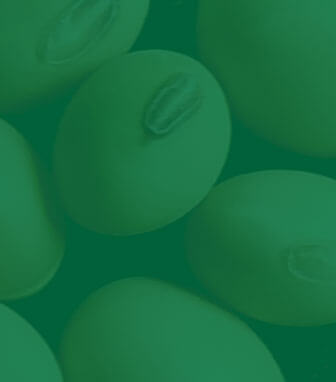

The objective of this swine study was to evaluate whether high levels of soybean meal (SBM) could modulate the pig’s response to a respiratory disease challenge by reducing systemic viral replication and modulating the immune system. A total of 2,112 pigs weighing about 6 kg were placed into two nursery rooms of 48 pens each (22 pigs/pen) under commercial conditions to evaluate the potential of SBM levels (low, medium, or high) in combination with phytase (560 or 1415 analyzed FTU/kg) to improve growth and health of weaned pigs originating from a porcine reproductive and respiratory syndrome (PRRS) affected sow farm.
Results indicated no significant treatment main effects or interactions (P > 0.05) for ADFI, ADG or gain: feed. The percentage of pigs pulled for medical treatment declined linearly with increasing SBM levels (11.09, 9.15, 8.42%; P= 0.04). However, there was no reduction in mortality or improvement in the percentage of full value pigs (97.3, 97.4, and 97.3%; P = 0.97). Stool firmness decreased with increasing SBM during day 1 to 5 (linear, P = 0.01) and tended to decrease for day 1 to 10 (P = 0.13). Phytase tended to improve stool score for day 1 to 5 (P = 0.06) and day 1 to 10 (P = 0.14). Soybean meal levels did not affect (P = 0.31) viral load of PRRS when determined on day 20 or day 42. The researchers concluded that increased levels of SBM may be beneficial in health challenged pigs by reducing labor and cost associated with treatment for disease without impacting performance or viral load of PRRS. The tendency for high levels of SBM to cause stool looseness can be countered with a high phytase level.
Moran, K.., E. van Heugten, C. E. Zier-Rush and R. D. Boyd. 2016. High levels of soybean meal reduces medical treatment in nursery pigs affected by PRRS. J. Animal Sci. 94 (Suppl. 2): ASAS Midwestern Section (Abstract 202, page 93).
In another report, porcine reproductive and respiratory syndrome virus (PRRSV) and Mycoplasma hyopneumoniae (MHP), two significant respiratory pathogens in finishing pigs, often found together was studied. The researchers cited recent studies that implied that increasing soybean meal content of diets can be beneficial in pathogen-challenged pigs, while other reports suggest similar benefits by increasing the use of synthetic amino acids, specifically tryptophan (Trp). The objective of their study was to determine if increased synthetic Trp replacing a portion of soybean meal (SBM) would impact performance of late finishing pigs dual-challenged with PRRSV and MHP. Ninety-six mixed sex pigs weighing about 120 kg were selected and randomly assigned to a high SBM (SBM; 9 pens/trt) or synthetic Trp (SYN; 9 pens/trt) diet. Both diets were formulated to contain 0.70% TID lysine and were isocaloric; only crude protein was different between SBM and SYN diets (15.9 vs. 13.5%, respectively). After 96 day on test diets, all pigs were inoculated intratracheally with MHP and intramuscularly with a field strain of PRRSV. Growth performance and feed efficiency were determined until pigs reached market weight after which, carcass were assessed.
Results-During the 96 day pre-challenge period, no performance differences were detected between the two dietary treatments. As expected, antibody titers for PRRSV and MHP increased post inoculation. However, change in PRRSV antibody titers from 0 to 28 day post inoculation tended (P = 0.09) to be increased in SYN verses SBM treatment. MHP antibody titers and lung lesion scores did not differ between treatments. For the 28 day post-challenge period, there was no difference in ADG, ADFI, G:F, hot carcass weight, yield percentage or muscle depth (P<0.10). However, the SYN pigs had an increase in carcass fat depth compared to the SBM treatment (P = 0.01). Conversely, there was a tendency (P = 0.09) for carcass lean percent to be increased in SBM fed pigs (57.6 vs. 57.1%, respectively). Altogether, these data indicate that diets with increased synthetic amino acids or decreased SBM do not alter pig performance during a late breaking respiratory health challenge.
A. L. O’Connell, A.L., W. P. Schweer , K. Schwartz, G. Gourley , M. A. FitzSimmons and N. K. Gabler. 2016. Increased dietary soybean meal does not affect performance during a PRRSV-Mycoplasma hyopneumoniae challenge. J. Animal Sci. 94 (Suppl. 2): ASAS Midwestern Section (Abstract 411, page 187).